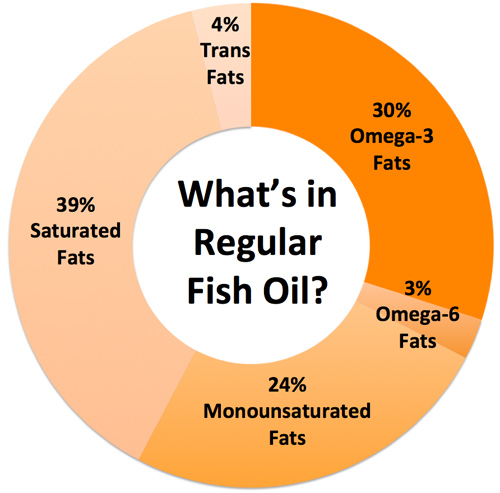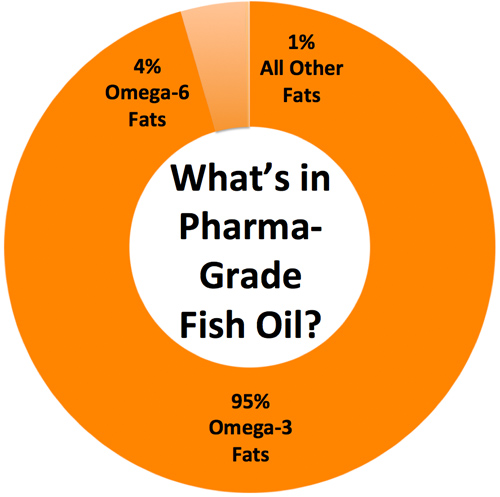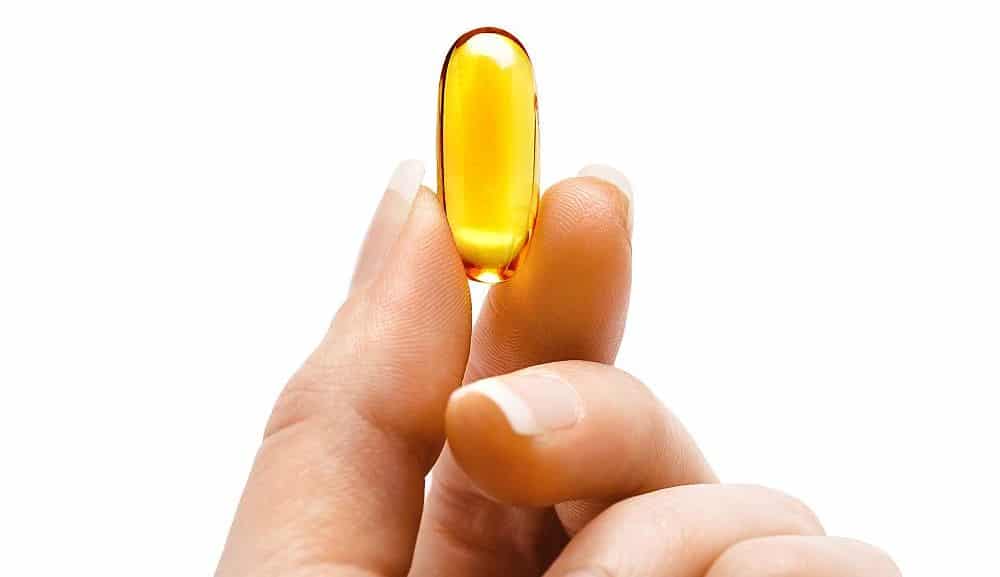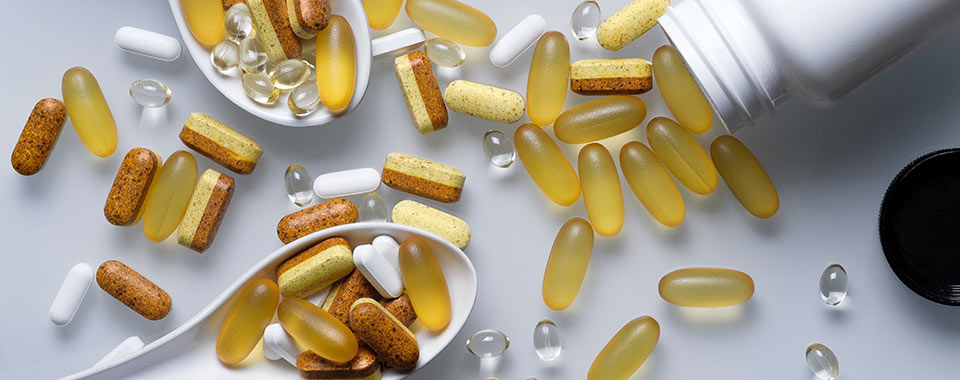Regular Fish Oil – what’s in it?
‘Regular’ fish oil is sold in most grocery, drug and warehouse stores. They are inexpensive – you can get several hundred pills for $15.
These oils are usually made from Sardines and Anchovies caught in the Pacific ocean, off the coast of Peru and Chile. The data for the chart above is from Sardine oil.
They contain a blend of Omega-3, Omega-6, saturated, monounsaturated and even some natural trans fats. (No, these trans fats have not been shown to be harmful.) These oils also contain some cholesterol.

Since most people use the terms ‘fish oil’ and ‘Omega-3’ interchangeably and take fish oil for its Omega-3 content, it may be surprising to see that only 20-30% of the oil is actually Omega-3.
Now you know what the other 70% is.
Ultra-concentrated Fish Oil
Regular fish oil is the starting raw material used to make concentrated fish oils. Low-Omega-3 oil is concentrated using molecular distillation to provide a product that is mostly Omega-3 and very little of anything else.
The ‘other 70%’ is removed.
In other words, more of what you want and less of what you don’t.

The only downside with concentrated fish oil is that the naturally present Vitamins A and D are removed. With fat/sun-phobia still raging, people have become Vitamin A and D deficient. If you want your fish oil to contain Vitamins A and D, they’re not in regular fish oil either. You’ll need to take unrefined salmon, pollock or cod liver oils.
Fish Oil and Environmental Contamination
Unlike less concentrated oils, ‘pharma grade’ oils have less mercury and PCB contamination.
When IFOS compared fish oils with less than 50% Omega-3 vs fish oil with more than 50% Omega-3 for environmental contamination, both groups passed the test, but they found almost 80% more PCBs in the lower concentration oils.
The lower concentration oils had 3X as much mercury as well. If IFOS had sorted their oils into four groups – 30% Omega-3 oils, 50%, 70% and 85%+, I suspect that they would have found bigger differences between the lowest and highest Omega-3 groups.
The term ‘Pharmaceutical Grade’ does not have an official FDA definition. It was coined by Dr. Barry Sears of Zone Diet fame 20 years ago. It used to mean that the oil had 50 or 60% Omega-3, which was a lot back in the 90s. Nowadays, it’s used to refer to oils that are about 85% Omega-3 or higher.
The data for the charts above and the table below is from an analysis of a recent lot of OmegaVia (Lot# UC130542) tested at IFOS.
| Regular Fish Oil |
Ultra-concentrated Fish Oil (OmegaVia) |
|
| Omega-3 | 30% | 95% |
| Omega-6 | 3% | 4% |
| Monounsaturated | 24% | 0.2% |
| Saturated | 39% | <0.1% |
| Natural Trans | 4% | <0.1% |
These numbers will vary slightly from year to year, between products and types of fish.
- Sardine and Anchovy have very high levels of Omega-3 with a 3:2 ratio of EPA and DHA.
- Salmon oil tends to be a little lower in Omega-3. Salmon oil is made from ‘offal’ or parts of the fish that’s not a filet. The muscle meat of filets is not where most of the Omega-3 are stored.
- Tuna oil is high in DHA and is usually made from Tuna eyes. Eyes are full of DHA. Our ancestors were onto something with their fish head and eye ball soups.
- Pollock and Whiting oil often have a 2:1 ratio of EPA and DHA. These Alaskan fish are processed similar to Salmon.
Detailed fatty acid profile comparison:
| Regular Fish Oil |
Ultra-concentrated Fish Oil (OmegaVia) |
|
| Omega-3 Fatty Acids | ||
|---|---|---|
| Linolenic (LNA) | 1% | 0.2% |
| Stearidonic (STA) | 3.3% | 2.7% |
| Eicosatrienoic (ETA) | 1.3% | 1.7% |
| Eicosapentaenoic (EPA) | 18.3% | 67% |
| Docosapentaenoic (DPA) |
1.8% | 2% |
| Docosahexaenoic (DHA) |
7% | 22% |
| Omega-6 Fatty Acids | ||
| Linoleic (LA) |
2.5% | 0.2% |
| Arachidonic (AA) |
0.2% | 0.9% |
| Gamma-linolenic (GLA) |
<0.05% | 0.1% |
| Dihomo-gamma-linolenic (DGLA) |
<0.05% | 0.1% |
| Docosadienoic |
<0.05% | 2.8% |
| Adrenic |
<0.05% | 0.2% |
| Natural Trans Fatty Acids | ||
| Vaccenic (VA) |
3.7% | <0.1% |
| Monounsaturatred Fatty Acids | ||
| Oleic (OA) |
9.8% | 0.2% |
| Palmitoleic (POA) |
12.5% | <0.1% |
| Saturated Fatty Acids & Cholesterol | ||
| Stearic (SA) |
3.6% | <0.1% |
| Palmitic (PA) |
22.8% | <0.1% |
| Myristic (MA) |
12.4% | <0.1% |
| Cholesterol | 1-2% | <0.1% |
Your turn…
Do you take concentrated fish oil?
Do you think it’s worth the added cost?
Let us know in the comments section.
*These statements have not been evaluated by the Food and Drug Administration. This product is not intended to diagnose, treat, cure, or prevent any disease.



Hi Vin,
This is my first post so go easy on me:) I have been reading through your commentary and absolutely love it.
Okay in answer to you question I do take pharmaceutical grade fish oil. At the moment I take the Nutrigold Omega 3 Pharma Grade but am going to complement that with the OmegaVia on a daily basis.
The extra cost to my mind is negligible and in all seriousness if you shop around you can make very modest purchases. I live in Australia and to be honest we pay top dollar over here for products which subsequently means I purchase everything overseas. It is in fact cheaper for me to buy online than what it is to support the local health food store. Sad but true.
I would like to be educated more on the comparitive differences between DHA and EPA and the need for complementing certain vitamins together. I only recently discovered that Iron and Vitamin C should be taken together and given that I had a kidney stone which I am inclined to think was from excess Vitamin D3 use(10,000IU daily) I am now cautious when it comes to this and looking to increase my knowledge in this area. Magnesium, K2, D3, A and Curucumin are my areas of interest as well.
Thankyou for all the work you put in.
Cheers Ozzie
Hi Ozzie – some kidney stones are caused by inappropriate calcium deposition and this is often caused by imbalance in fat soluble vitamins like A, D, E and K2. Often it’s too little K2. You are taking a LOT of D and very little or none of the other three. Sounds very unbalanced to me. Magnesium and curcumin are great too. Instead of getting all these nutrients from supplements, I’d look into dietary sources of each and go at it from that angle. Until you figure your diet out, you may want to try this: http://www.amazon.com/Nutricology-Vitamin-Complete-Capsules-Count/dp/B003YQCZDC/
We’ve addressed the benefits of EPA in several blogs over the last 2 years. Check out the archives. Here is one example: http://www.omegavia.com/why-omegavia-is-high-in-epa-omega-3-part-1/ We’ll address the merits of DHA in future articles.
Hii vin,
I need your help!I have Vitamin A Toxicity. I want to take Omegas during this period of Vitamin A detox. I have tried most Omega-3 brands here in India that may secretly contain vitamin A in them.
I recently saw your blog on this website that concentration removes Vitamin A & D. Is it really true? If it is then I should have tried your supplement. 😊
Hi Hrishikesh – I’m a bit puzzled. Were you formally diagnosed with Vitamin A toxicity with blood tests? If you have a formal diagnosis, then we will step out of the way – please follow your doctor’s guidance.
Vitamin A toxicity is exceedingly rare. It is usually a result of accidental Vit A overdose or from prolonged use of anti-acne medications. If accidental overdose or anti-acne medications do not apply to you, then the likelihood of toxicity is extraordinarily rare – you’re chances of getting struck by lightning are higher.
If you think you got an excess of Vitamin A from local (low quality?) fish oil supplements, I’d say that’s virtually impossible. I’ve never heard of anyone getting Vitamin A toxicity from taking fish oil supplements because there’s hardly any in them, even the lower quality and less purified ones. It’s hard to get Vitamin A toxicity even if you supplement with 5,000 to 10,000 IU of Vitamin A daily, which is what many Vitamin A supplements contain.
Keep in mind that the average amount required to cause Vit A toxicity is 100,000 to 150,000 IU per day taken daily for months or years. Yes, it is that difficult to get into toxicity range.
Regardless, increase your Vitamin D3, Vitamin K2, and Vitamin E (the other 3 fat soluble vitamins) to help bring your Vit A level into balance.
Hi Vin,
Thankyou for the promptness of your reply. I should have clarified my comments by including the following details. I try and eat as “clean” as possible. Typically I would commence the day by drinking a glass of purified water with a tablespoon of ACV. This is followed by a bowl of boiled buckwheat with chia seeds in a plentiful supply of coconut milk.I finish this off with 5 grams of Nutrex spirulina. Mid morning is accompanied by 2 boiled free range organic eggs. Lunchtime is always a dish that has boiled brown rice with either tuna, chicken etc. Mid afternoon includes a couple of bananas. Dinner time will consist of either brown rice again or often quinoa in its place with either salmon, turkey or chicken and lightly fried kale. I finish this off with 2 of the Nutrigold fish oil tablets, another 5 grams of spirulina and a tablespoon of coconut oil. That’s basically me for the day. In the last week I took your advice and incorporated a tablespoon of sauerkraut before the meal on an empty stomach. I feel a real difference just with this. I suspended the use of the D3 following the kidney stone episode 6 months ago but would like to reintroduce it again. I am very mindful of its importance but even more so the need to be taking it in conjunction with other stuff that complements it. Does that seem a reasonable protocol Vin? I am 43, 184cm in height and weigh 74kg. By all accounts I am skinny compared to most and obviously very lean. I don’t have a blood profile to submit but feel pretty good although I know I could feel better.
I remain very interested in the use of the omega 3’s but I will add Vin that sometimes I wonder if we are missing out on its real benefits by focusing on concentrations of individual constituents in the absence of how the oil works in its whole state. Does that make sense Vin. If you take DHA or EPA individually then does that compromise it’s efficacy. I say that because you don’t get to choose if you eat a piece of salmon. I am definitely sold on the use of high quality grade fish oils. I just think that I need to look at other areas like the MAGNESIUM L Threonate, K2,turmeric and D3. Like most people Vin, I think you get to an age where you want to maintain mental acuity and perhaps improve upon it. I understand the research into nootropics is problematic and yet promising.
Cheers and thankyou for your advice. I appreciate and respect your opinion.
Ozzie
Hi Ozzie – getting your nutrients from your foods, like you’re trying to do, is always best. I’d rather get my Omega-3 from seafood as much as I can. But I dont get around to eating it as often as I should – for several reasons. My guess is that this is the case for most people. That’s when supplements come in handy. Taking EPA and DHA does not equal eating a meal of wild salmon in anyway, other than possibly matching the Omega-3 content. There are dozens of nutrients in actual fish and only 2 or 3 in a fish oil supplement.
Vin,
Thankyou for that. Can I ask you why it is that we dont see a more “complete” fish oil supplement that reflects what would be found in salmon. I say this given your narrative in relation to omega 7. I understand that the process is not simple but it does beg the question. Incidentally your fair and balanced approach to this subject is a breath of fresh air.
Incidentally am just about to purchase the Nutricology 🙂
Cheers Ozzie
Hi Ozzie – a complete fish oil supplement exists – real fish! 🙂
People are deficient in Omega-3 and that’s the deficiency that fish oil supplements address. Nothing more. There is a product called WholeMega, which contains small bits of Omega-7 and a couple of other nutrients. This, unfortunately, only has the illusion of being a whole or complete product. It still does not come close to the nutrition that eating fresh, wild, cold water fish provides. Supplements simply aren’t meant to do that.
Hi Vin,
I hear you when it comes to eating fish. Unfortunately I am very suspicious of the “quality” of the fish that we now eat particularly when it comes to eating farmed fish, GMO, mercury, freshness etc. I am an advocate as you are for getting all the essential nutrients but what faith do you personally have in the food that you are eating? This is the real problem Vin. And I honestly believe this is one of the principal reasons why consumers gravitate towards taking supplements.
So in answer to you question as to cost I have no issue in paying premium dollars for good quality fish oil supplements. Let me give you the following examply. Over here in Australia I would pay about $30 plus for a kilo of salmon steak. That would give me three servings for the week(300gram servings which are quite modest in size when cooked). Now you do the math. Bear in mind in the majority of instances this is farmed fish and you dont really know how old the fish is. Now you do the math. I have far greater faith in your product and companies like Nutrigold than what I do in going to the local supermarket to make a purchase. I would like to purchase the real deal from say Canada but it is prohibitively expensive when purchased here when you take into account transportation costs. Do you know of an ethical seller who ships world wide that one could purchase good quality fish?
Cheers mate, Ozzie
Is there any research out there on the effects of high quality omega 3 on passive liver congestion caused by early stage right ventricle heart failure? I know there have been positive effects on treating this with the ubiquinol form of CoQ10. Long standing liver congestion from this can lead to fibrosis/cirrhosis if not properly treated in 20-30% of people
(sim. to long standing alcohol/drug abuse, etc)
Hi Alan – I am not aware of any studies on fish oil directly having an impact on this condition. It is plausible that fish oil could have a secondary effect given its effect on heart health.
I have a couple of bottles of OmegaVia capsules that I use when traveling; otherwise I use either Nordic Naturals Ultra Omega, SFH, or Dr. Sears bottled liquid form. The Nordic Naturals and SFH show slightly higher levels of omega 3 (EPA,DHA,etc) per 5 ml than Dr. Sears (about 3 gr vs 2.8 gr per 5 ml) but I’ve noticed that only the Dr. Sears oil stays in liquid form when put in the freezer. The Omega Via capsule contents also stay in liquid form. However, the Nordic Naturals and SFH congeal (soft but congealed) when put in freezer (Nordic congeals and won’t pour and SFH pours like a heavy syrup).
I would think the higher omega 3/5 ml concentration would be less likely to freeze but that’s not the case. Does it have to do with Dr. Sears being an ethyl ester vs the tryglyceride form for the SFH and Nordic Naturals? Bottom line is that I’m just trying to determine if I’m getting the amount of omega stated on the bottle and are they all of similar quality (5 star)? Tryglyceride form vs ethyl ester form; any significant health difference?
On a different note regarding my post above about passive liver congestion, just found out I have severe tricuspid regurgitation of the tricuspid heart valve that’s backing up blood in liver. A surgical repair/replacement will most likely be done in near future. Fortunately, the rest of the heart is in good shape ie: no right heart failure, etc. I actually had a Dr. back in Jan 2014 tell me that the slight liver enzyme elevations were nothing to worry about!!!! Moral of the story for everyone reading this blog is to take control of your health and do your homework if you all of the sudden see some test result out of wack. A simple blood chemistry test for $76 at AnyLab will tell you wonders about your health………not to mention a yearly physical. I still got a tough road ahead of me with surgery but if I had let this go for a period of time, I was heading for serious right heart, liver, etc damage/failure……..not good.
Hi Alan – with all three of those brands, you will get what you’re promised. I am very familiar with Nordic Naturals and Dr Sears’ products. Both are excellent. SFH is a newer entry and looks very promising. The reason Nordic and SFH solidify is that they contain more non-Omega-3 ingredients than Dr Sears product. This is not a triglyceride versus ethyl ester thing – it is an Omega-3 potency thing. I am in the process of evaluating several triglyceride liquid oils (with more Omega-3 than the three brands you mention) and it never freezes – it is almost water-like in its consistency when I pour it into a spoon. The only difference between TG and EE liquid fish oils is that EE liquid fish oils tend to have a ‘bite’ when you taste them. TG liquid fish oils are smoother and easier on the tongue. Good luck with the upcoming surgery – you are right, YOU have to get involved in your health. The medical system is not set up to detect and address the root cause of most chronic disease or cases like yours. Take care.
I would like to know are you familiar with Purity Product or Dr Mercola product if so are they any good?
Hi Maxine – yes, I am familiar with both. They make several products, so hard to say if the one you’re considering is any good. I’m not a fan of krill oil at all, in case that’s what you were thinking of. Krill oil is over-hyped and over-priced. You’re better off getting your Omega-3 from somewhere else…like fish.
Hi,
I noticed that you used to make your fish oil with alaskan pollock, but now make with with sardines and anchovies. Was there a reason for the change? I was always a little cautious of eating anchovies due to any possible build up in domoic acid. Is that removed during the process.
Thanks,
JB
HI JB – we still like alaskan pollock oil and use it in some of out other products. We wanted to use a smaller, shorter-lived, algae-eating fish that were lower down the food chain. This is currently an option but it may change depending on how El Niño affects fishery in the coming years. I’ve described some of the other changes here: http://www.omegavia.com/improvements-omegavia-supercritical-co2-fish-oil/
As far as domoic acid, it is not a fatty acid but rather an amino acid, which are very easily removed during processing because Omega-3 are separated out using distillation/boiling points. Domoic remains behind due to its boiling point being several hundred degrees higher.
I’ve read that vitamin D supplements are derived either from plants(D2) or from animals: fish fat or lamb’s wool(D3). Unfortunately, you’ve posted that vitamin D is removed from pharmaceutical grade fish oil. Does that mean it’s fair to say OmegaVia doesn’t have any vitamin D in its capsules? And I’ve read that vitamin D3, found in supplements, is mostly or entirely in the form of cholecalciferol. Not sure how reliable the sourse was, but I read that Cholecalciferol is found in rat poison. Can you confirm this? And if its true can you please recommend a healthy, non-toxic vitamin D supplement?
thanks in advance!
Hi Mike – I think you’ve been reading some dicey materials. Most fish oils don’t have D3 in them. Fish liver oils can have small quantities, but rarely enough to bring people out of deficiencies. Virtually all D3 supplements are made from lamb/sheep wool. They’re safe and standardized. Most D3 supplements on the market are the same – choice is a matter of pricing and IU dosage and how much you need to get to a healthy 40-60 range.
Hi Vin,
I have a question about the omegavia fish oil. Can you please check and confirm if the fish oil is modified to have higher EPA and lower DHA? Or is this just the way it was in the fish that is caught and then heavy metals distilled?
The reason I ask is that my naturopath says that it is best to consume the fish oil that has no manual intervention to change the ratio of EPA to DHA. It is best to have it close to how it was existing in the fish, as that is close to the way nature had made it.
I get confused on why so many supplements of different companies have different EPA/DHA ratios? Is it that you or other companies are manually adjusting the ratio of EPA/DHA?
Hi – yes, we purposely increased EPA to help with inflammation and several other health benefits.
More on why here:
http://www.omegavia.com/why-omegavia-is-high-in-epa-omega-3-part-1/
http://www.omegavia.com/why-omegavia-is-high-in-epa-mood-benefits/
http://www.omegavia.com/why-omegavia-is-high-in-epa-omega-3-dha-and-your-brain/
We don’t disagree with the ‘fish know best’ approach. Actually, we quite agree and think eating fish is much better than taking fish oil supplements.
Hi Vin,
Where does the vaccenic acid come from ? Is it associated with bacteria in the gut or food source?
Thanks
Hi Aurjan – it is naturally found in fish. Some gut flora can process this fatty acid.
So you think that the gut bacteria in fish are making this fatty acid… and it gets into the oil maybe from contamination with gut viscera? if there is a measurable amount, then there has to be some source of it.
Hi Aurjan – no, i don’t think the fish gut bacteria is producing this. It is probably a natural part of the food chain. Phytoplankton probably have some and is concentrated in fish a tiny little more – just my guess. But the levels we’re talking about is tiny. It’s a part of fish and has always been. Because we focus on EPA and DHA, we process most other fatty acids out. So you’re not going to see much of it in our products.
In response to Anonymous, June 16, you said you purposely increased the EPA… How is that done?
Hi Aurjan – this is done using supercritical CO2 chromatography. This separates out EPA and DHA into different streams. We can recombine them to any ratio we wish.
I have 10 year old dog with recurrent soft tissue sarcomas. Her oncologist has her on chemo and some complementary supplements. One of the items I have started giving her is Innovix Pharma-Grade Omega-3. These are coated so are they appropriate for a canine digestive system. She gets 6 per day.